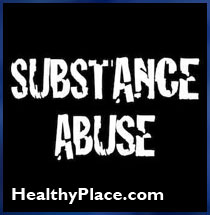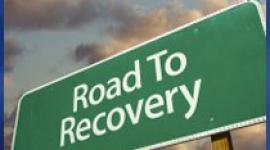Addictions Treatment: Online Conference Transcript
Perpetual Powerlessness and Never-Ending Recovery
 Anne Wayman, author of the book Powerfully Recovered, joined us to discuss her view of 12 step programs, recovery, and powerlessness as these issues relate to substance abuse and addictions.
Anne Wayman, author of the book Powerfully Recovered, joined us to discuss her view of 12 step programs, recovery, and powerlessness as these issues relate to substance abuse and addictions.
David Roberts is the HealthyPlace.com moderator.
The people in blue are audience members.
David: Good Evening. I'm David Roberts. I'm the moderator for tonight's conference. I want to welcome everyone to HealthyPlace.com. Our topic tonight is "Addictions Treatment: Perpetual Powerlessness and Never-Ending Recovery."
Our guest tonight is Anne Wayman, author of the book Powerfully Recovered. Anne maintains that all the talk in 12-step programs, like Alcoholics Anonymous (AA), about perpetual powerlessness and never-ending recovery are simply false myths that are doing real damage to both 12 Steppers and to many who need recovery but refuse it.
Good evening, Anne, and welcome to HealthyPlace.com. Thank you for joining us tonight. Can you please tell us a bit more about yourself, who you are today, and also give us a feeling of your previous relationship with various substances?"
Wayman: Hello David and everyone! I'm glad to be here.
I'm a firm believer in the 12 Steps - recovered alcoholic and addict, currently living in San Diego - I'm a writer, a grandmother, a potter, etc.
David: How long were you dealing with substance abuse?
 Wayman: Let's see, I first started getting drunk in college, but my father was in AA and I had been at AA meetings, so I knew how to change my pattern of drinking. I controlled, more or less (mostly less as time went on), my drinking until I had a car accident at 32 which sent me to the Program. I also claim addiction because I discovered I was abusing prescription drugs.
Wayman: Let's see, I first started getting drunk in college, but my father was in AA and I had been at AA meetings, so I knew how to change my pattern of drinking. I controlled, more or less (mostly less as time went on), my drinking until I had a car accident at 32 which sent me to the Program. I also claim addiction because I discovered I was abusing prescription drugs.
David: And this went on for how long?
Wayman: How long is... say... 18 to 32? I'm not good at numbers.
David: And then you started with your recovery. What did you to do recover from alcohol and drug addiction and how long did it take you?
Wayman: I came to my first AA (Alcoholics Anonymous) meeting at 32 and stayed sober from then on... not easily or gracefully, but I didn't slip... more by the grace of God than of my own efforts. It took about 5 years, give or take, to really settle in and start to feel like my skin fit.
David: So the audience knows, Anne has been clean and sober for 25 years. As I mentioned at the beginning, Anne has a different concept of what 12 step programs should be.
One thing I want to make clear, Anne. For years, you participated in Alcoholics Anonymous (A.A.), Narcotics Anonymous (N.A.), Debtors Anonymous (D.A.) and other 12-step programs and you learned a lot from them. They helped you in your recovery. Am I correct in saying that?
Wayman: Oh yes, and I still participate, but not as intensely. The 12 Steps act as my foundation. I also draw from all sorts of other things, spiritual, self-help, and my own intuition now.
David: Anne, we may have people here tonight who may not have a complete understanding of 12 step programs. So, for them, could you please briefly explain the concept of "powerlessness" and "recovery" from the 12-step program viewpoint?
Wayman: David, the first step says, "We admitted we were powerless..." and I've come to see that it means, before the steps, we are totally and utterly powerless over our addiction. But after we've worked through the steps well, and settled down, we needn't fear our addiction any more (not cured). What I hear so often around the tables is statements like "I'm powerless over everything in my life." Do you follow?
David: I do, and I want to explore that more in a few minutes. Could you also explain, from the 12 step point of view, the idea of "recovery."
Wayman: Hmmm, as we often hear it around the 12 step tables, recovery is the ongoing process of letting go of our addiction and the emotional problems that contributed to it. I believe, however, that we can become recovered - like it says in the forward to the first edition of the Big Book - recovered in the sense that we can get fully back to life, free of our addiction.
David: And when you use the term "Powerfully Recovered" (the title of your book), what do you mean by that?
Wayman: That the goal of any 12 Step Program is real freedom from addiction, that we can become 'recovered' in the sense of not being sick, and that we can take powerful action in our lives on our own behalf.
David: The two things I want to emphasize tonight is the idea of "powerlessness" over one's addiction and behaviors and secondly, that recovery is an ongoing process. Everyone who enters A.A., for example, is told that recovery is an on-going thing. However, after years of meetings, you found that less involvement in recovery and engaging more in the outside world and other activities was really helpful to you. How so?
Wayman: Recovery is ongoing in the sense that we grow up. When I started exploring the world, my first venture was to a folk music club. I found just not being at an AA meeting every night meant my life expanded. I've done all sorts of things, from new age to psychology studies.
I also discovered that when I came back to a meeting after, say, a night at the folk music club, I was fresher and freer and had more to say that made sense at the meetings.
|
|
David: I guess what you are saying is your life had/has become more than AA meetings.
Wayman: Yes, much more, and I believe that's what the Program - the 12 Steps - is actually designed to do - let us go back to the world that we rejected because of practicing our addiction.
David: You don't believe that people are powerless over their addictions/behaviors, do you?
Wayman: Let me put it this way: My alcoholism and drug addiction is no longer a major issue. The promises on pp 84-86 have come true for me fully. And yes, I have a great deal I can do about my behaviors; always, however, with the foundation of the 12 Steps. The steps are simply a spiritual discipline. I'm not sick and getting well anymore.
David: Anne Wayman's website is here: http://www.powerfullyrecovered.com
Anne's book is: Powerfully Recovered: A Confirmed 12-Stepper Challenges The Movement." It can be purchased by clicking on this link.
I want to get to a couple of audience questions before we continue our conversation. Here's the first one, Anne:
TexasCounselor: Why do you think the statement "we are powerless" can do harm?
Wayman: Texas, when we say we are powerless over everything, we limit ourselves. I'm also convinced that telling someone in a ghetto, for instance, that they must always be powerless makes it extra hard for them to come... and I don't think that's what the program means.
MiracleMeGPC: Why do you think it is harmful to turn 'everything' over to God?
Wayman: Miracle, I don't think that's harmful. I pray a lot, but I also believe that I am a co-creator with the Source or the Higher Power. It's a question, I think, of attitude. Does that make sense or answer your question?
David: You have several major philosophical disagreements with the 12-step programs. I'll put them up one at a time, and I'd like you to comment on them.
1. Members get stuck.
Wayman: Yes, and by stuck I mean afraid of life beyond the 12 Step rooms; stuck in life because they feel they are different than others. Not everyone does this, but quite a few.
David: 2. Many never even attempt recovery because of the idea that "you'll never completely recover."
Wayman: I've spent some time in inner cities and I think to tell people there they must remain powerless leads them to say "no way." Many of those people have a whole different view of powerlessness, and to tell someone they have to stay sick is not very attractive.
David: Are you saying that the idea of "ongoing recovery," never being completely free of your addiction, leads people to say "then, what's the point of even trying?"
Wayman: David, I think there's some real confusion over recovered and cured. Cured would mean we could drink (or whatever) again. I'm certainly not saying that! Recovered, however, is a stronger position for self-worth and ability to take action. Besides, the Big Book uses the word recovered at least 11 times and recovering only once.
David: 3. Long time members of 12-step programs don't stay around long after their recovery.
Wayman: That's a more iffy proposition - a few do, but I've been surprised at how many I've met who no longer attend meetings. When I ask why it seems to be around these very issues. By the way, I believe the Program, as it's written, is just fine. It's the stuff we tend to tell each other that takes on the tone of gospel. That's where we get in trouble.
David: You're saying these people have recovered and moved on with their lives. That their addiction isn't the primary thing in their lives any longer?
Wayman: Yes, exactly, and the tone, if you will, of perpetual powerless that shows up in so many meetings is a bit discouraging. It's almost as if we become afraid to claim we are recovered.
David: Here's an audience comment on just that point:
ddoubelD: I'm thinking about joining a twelve step program but I also hedge cause it sounds like you never graduate.
Wayman: double - that saying, 'you never graduate' isn't in the Big Book. It's a saying that's grown up over time. The Big Book says we can become recovered.
David: 4. Alcoholism, drug addictions, spending problems are "diseases" that people suffer from.
Wayman: I also think there's an overemphasis on the disease theory. I'm no longer sick.
David: Do you believe that addictions are diseases?
Wayman: Not in the sense you can catch them, and not even like diabetes which requires an outside solution. Recovery is an inside job. If you use the word disease like dis-ease, then I think it fits better.
|
|
David: Here are a couple of more audience comments, then I'll post some audience questions for Anne.
bcain2001: Alcoholism is a self-inflicted disease.
ddoubelD: I don't believe these are diseases in the classical term. They are character flaws and weaknesses.
bcain2001: My father attended the 12 -step program twice and went inpatient. He drank until the day he committed suicide last year and I know several more like him. I don't believe the 12-step program even works in today's society.
TexasCounselor: Applause for you! I did my clinicals working with a drug and alcohol counseling group and saw too many use that as an excuse and never really take responsibility for their actions.
David: Here's the next question, Anne.
MiracleMeGPC: Can you be 'recovered' and still in 'recovery' at the same time? Do we have to go to 12-step meetings for the rest of our life, until the day we die, in order to stay clean and sober?
Wayman: Miracle, I'm recovered and I'm still growing all the time. And I don't think you have to go to meetings forever - not at all - not to stay clean and sober.
David: I think one thing that's important to mention here, Anne, is that you consider yourself recovered. You have been clean and sober for 25 years. Do you feel in danger of a relapse at any moment or down the road if you don't go to 12 step meetings, etc.?
Wayman: No, that's the point. The Big Book promises we no longer need to be afraid. Could I relapse? Sure, but it's my spiritual life that keeps me sober/clean now. The meetings and working the 12 steps set the stage. Now I'm back in life and others can be too. There is no need for the fear.
David: And maybe one of the most important things you speak of is the concept of "recovery." Many of the guests we've had here talk about recovery as being some illusive thing. As long as you do this or that, you'll be okay. But, they say, relapse is just around the corner. What do you say to that?
Wayman: I say that if we do a good and honest and complete job with the steps, recovery is not illusive at all. Why should it be illusive?
David: One thing I thought was interesting in your book is that by identifying addictions as a disease, people start over-identifying themselves with the "disease." They are their addiction or dysfunction, rather than seeing themselves as being parents, computer programmers, etc. with an addiction.
Wayman: Yes, we are so very much more than our addictions. We are whole beings, discovering how to be the best beings we can be. My alcoholism is important but not as my ground of being. It's only a part of who I am.
David: Just a couple of site notes here and then we'll continue:
Here's the link to the HealthyPlace.com Addictions Community. You can click on this link and sign up for the mail list at the top of the page so you can keep up with events like this.
Here's a good question, Anne:
MiracleMeGPC: So the 12-step meetings are more for getting ourselves back on the right track? Do you still go to 12-step meetings?
Wayman: That's certainly one way to frame it, Miracle. I go occasionally, but not very often. You'll more often find me on online meetings - great for touching base.
David: And from your perspective, the reason for going to AA or other 12-step meetings is what?
Wayman: Now? To give back but sometimes that's really hard when the meeting is more focused on powerlessness, etc.
David: And what about in the beginning?
Wayman: I went to some 400 meetings my first year, and needed every one... but... if there had been more talk about becoming recovered, my recovery would have been quicker. David, I want the fellowship to shape up.
David: We've talked about some of the things that are wrong with 12-step programs. Why should someone participate in one or do you feel they shouldn't? Should they seek an alternative treatment program?
Wayman: I know people get sober in other ways, but my experience is in 12 Step groups. I'm all for them. I think the quality of recovery or becoming recovered is better or more likely because the 12 Steps are a spiritual discipline. Yes, send them all to 12 Steps, but let's quit pretending recovery is never-ending.
David: You also maintain that 12-steppers have lost their sense of what "normal" really means. That it's not normal to practice an addiction and it turns people into "victims" to keep thinking that way.
Wayman: David, there's a huge difference between the program and fellowship. Yes, I refuse to consider myself or anyone else abnormal because they don't drink/use etc. It's the addiction, practicing the addiction that's abnormal.
David: So, to clarify for everyone here tonight, you believe 12-step programs have a lot to offer. It's some of the people who run the programs and participate in them that makes it difficult to fully recover and believe in the concept of a full and complete recovery.
Wayman: Yes, but not deliberately. Myths have grown up in the fellowship over time.
David: Thank you, Anne, for being our guest tonight and for sharing this information with us. And to those in the audience, thank you for coming and participating. I hope you found it helpful. We have a very large and active community here at HealthyPlace.com. You will always find people in the chatrooms and interacting with various sites.
Also, if you found our site beneficial, I hope you'll pass our URL around to your friends, mail list buddies, and others. http://www.healthyplace.com
Wayman: My pleasure David and everyone else.
Disclaimer: We are not recommending or endorsing any of the suggestions of our guest. In fact, we strongly encourage you to talk over any therapies, remedies or suggestions with your doctor BEFORE you implement them or make any changes in your treatment.
|
|
back to: Addictions Conference Transcripts
~ Other Conferences Index
~ all addictions articles
APA Reference
Gluck, S.
(2007, August 1). Addictions Treatment: Online Conference Transcript, HealthyPlace. Retrieved
on 2025, April 13 from https://www.healthyplace.com/addictions/transcripts/addictions-treatment-online-conference-transcript



